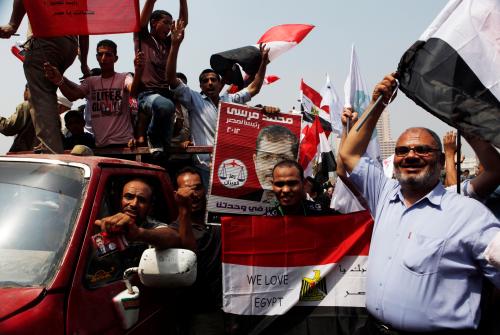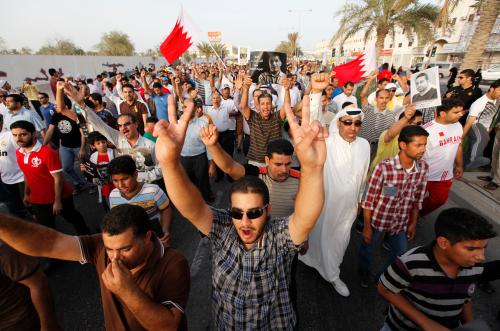2012
Content from the Brookings Doha Center is now archived. In September 2021, after 14 years of impactful partnership, Brookings and the Brookings Doha Center announced that they were ending their affiliation. The Brookings Doha Center is now the Middle East Council on Global Affairs, a separate public policy institution based in Qatar.
On October 17, 2012, the Brookings Doha Center (BDC) hosted a videoconference policy discussion on the U.S. presidential election. Speakers in Washington and Doha debated both candidates’ foreign policies toward the Middle East and how those policies could affect U.S. relations with the Arab world. The panel in Washington featured Tamara Wittes, Director of the Saban Center for Middle East Policy at Brookings, and Danielle Pletka, Vice President of Foreign and Defense Policy Studies at the American Enterprise Institute. They were joined in Doha by Al Jazeera Arabic presenter Ghada Oueiss and Shadi Hamid, Director of Research at the Brookings Doha Center. The discussion was moderated by BDC Director Salman Shaikh and attended by members of Qatar’s diplomatic, academic, business, and media communities.
Tamara Wittes began the discussion by emphasizing the relative unimportance of foreign policy issues in an election that remains largely focused on domestic issues. Noting a U.S. mood that is “tired of extensive foreign engagements,” she said the result of the vote would likely be determined by “jobs and the economy.” A recent intensification of the discussion on foreign policy, she asserted, was driven not by a shift in voter interests, but by the opportunism of the Romney campaign following the events in Benghazi and Cairo last month.
Wittes went on to say that there are only marginal differences between the stated foreign policy positions of Barack Obama and Mitt Romney; Romney is more willing to use the threat of military force with Iran and more skeptical of any progress in the peace process between Israel and the Palestinians. The real difference, she said, is in the narratives promoted by each candidate with regard to the role of the United States in the Middle East and the world at large. While Romney argues that a period of U.S. weakness has fed chaos and uncertainty, Obama denies that he has shown a lack of resolve, pointing to his success in pursuing al-Qaeda and winding down the war in Iraq. While those in the region may despair that the realities of their politics are subsumed by what they see as cynical, self-serving agendas, Wittes said, it is important to note that Americans also find it frustrating when events in the United States become “political footballs” in the Arab world. She pointed to the recent anti-Islam film made in California and its “frustrating” impact.
Ghada Oueiss asserted that the U.S. had failed to bear its responsibilities in the Middle East, rendering its strength meaningless. She said Washington’s failure to act, particularly in Syria, was in part a result of the history of U.S. involvement in the region and its continued frustrations. She cited the lack of progress on peace between Israel and Palestine, the disaster of the Iraq war, and the fact that even after intervening to support rebels in Libya, anti-Americanism remained rife there. The real problem, Oueiss argued, was that because the United States had consistently prioritized its interests over its values, its policy toward the region had been corrupted by hypocrisies and double standards. Oueiss pointed to Washington’s current embrace of Islamists who have prospered through the Arab Spring, as compared with its rejection of the democratically elected Hamas government in 2006. The next president of the United States, Oueiss stated, must successfully deliver the comprehensive reform of foreign policy toward the Arab world that was promised by Obama in 2008 but never delivered.
Danielle Pletka agreed with Wittes on the U.S. disinterest in foreign policy – national security is only the ninth most important issue to American citizens today, according to a recent CNN poll. But Pletka argued that the poverty of the discussion on U.S. foreign policy – which she described as alternately “accusatory or proclamatory” – was also a function of Obama’s unwillingness to talk about it and Romney’s lack of experience in handling it. The result, she said, is that “we are all starved of information.” Pletka pointed to the “lack of flesh on the bones” of each candidate’s foreign policy vision and agreed that there was little to distinguish them. In his criticism of Obama’s “weakness,” Romney seemed to promise a more “engaged” approach, she said, though it was unclear what this would mean in practice. Pletka argued that there remains much interest among Arabs for U.S. involvement in the region – for example, in supporting Syrian rebels or helping to solve the Palestinian question. She said that Obama’s emphasis on withdrawing from Iraq and pivoting toward Asia had sent a terrible message, that the Middle East is a “second-tier concern” on which we are turning our backs. The revolutions in the Arab world and the challenges they present, Pletka insisted, call for a more active policy toward the region.
Shadi Hamid began by questioning the negative response to Romney’s October 8 speech on foreign policy speech as “shallow” or indistinct. While echoing “neocon clichés” about Obama’s “lack of confidence, clarity, and resolve,” he said, the speech did offer a coherent foreign policy message. Part of the reason for that is the truth in some of Romney’s assertions, Hamid argued. Even in the Arab world, he said, Obama is frequently seen as “weak and somewhat feckless.” More broadly, there is a sense that in its desire to decrease the U.S. footprint in the region, the current administration has “given up its leadership role.” Hamid pointed to Obama’s failure to impose a settlement freeze on Israel in 2010 and his acquiescence in the face of the Egyptian SCAF’s “war on NGOs” as examples of incidents that had fed this sense of U.S. weakness.
Another failure, Hamid said, was the general incoherence of Obama’s response to the Arab Spring. Though positive moves had been made in supporting democratic transitions in some countries, in others it was very much “business as usual.” The U.S. today, he said, is in a dangerous position in that both Arab revolutionaries and Arab autocrats feel they have been abandoned by Washington. Despite the efforts of policymakers, Hamid argued, it remains unclear to many exactly what the United States stands for in the region. Hamid went on to say that this gap between U.S. policies and how they are perceived in the region, could partly be explained by an “issue of trust.” However much Obama reassures U.S. allies in Israel or the Gulf, they continue to mistrust him, Hamid said. Part of the reason for this, he argued, was a failure to “build relationships of trust with key leaders” in a region where politics are often “personality-driven.”
Following presentations from each of the panelists the floor was opened to question. Abdul Baset Sieda, President of the Syrian National Council, was invited to speak. He offered stern criticism of the U.S. response to the Syria crisis, saying that it had “not been on the level we hoped for.” He questioned Washington’s placing a red line on the regime’s use of chemical weapons. “Does this mean that the use of all other weapons is acceptable?” Sieda asked, citing the use of cluster bombs and barrels of TNT to target civilians indiscriminately.
One audience member asked whether there would be more scope for bipartisan action in Congress following the presidential election. In response, Tamara Wittes pointed out that the debate on foreign policy was split not between Democrats and Republicans as much as between “internationalists” and those focused on domestic issues. Within each party there are those who see that the United States “cannot escape the world and so should lead in it.” Meanwhile, there is the emergence of a strong caucus in Congress that is focused on cutting the deficit and skeptical of foreign aid; this will remain the case, Wittes said. It is worth noting, she said, that the complexity of the debate on a more interventionist U.S. approach is very much paralleled in the Arab world.
Related Content

Shadi Hamid
June 20, 2012

Tamara Cofman Wittes
September 25, 2012
The 2012 U.S. Elections: What Next for U.S.–Middle East and North Africa Relations?
Agenda
-
October 17
-
Panelist
DPDanielle Pletka Senior Vice President for Foreign and Defense Policy Studies - American Enterprise Institute -
Panelist
-


